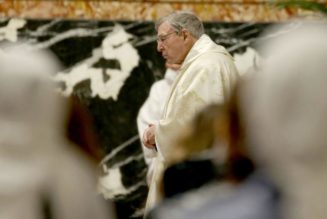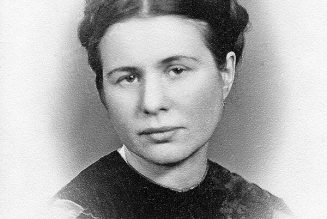
“Rejoice always” sounds beautiful when we hear it in Mass on the Third Sunday of Advent, Year B. Because it is beautiful.
It’s Guadete Sunday; we light a pink candle and in many churches, the priest wears that same “rose” color. The Church traditionally stops holding back, a little. Many parishes will hear the organ again and see flowers for the first time in weeks.
But just remember what allows us to rejoice on “Rejoice Sunday.”
Yes, we rejoice because Baby Jesus is coming at Christmas. But we also rejoice because Adult Jesus is here, now, and he wants us to turn off every distraction and spend real time with him now. And if the sun goes dark today, and the dead rise from their graves, and a booming voice retells the deeds of our lives as Christ the Judge stares into our souls, we should be able to rejoice even then.
“Rejoice always” — not just because you anticipate Christmas fun, but at the presence of Christ in your life today and the coming of Christ to judge your life tomorrow.
Each of these comings of Christ come up in the Mass today, but first St. John the Baptist sums up all three.
To truly rejoice at the comings of Christ, you have to know what to expect.
After all, you only rejoice that the landlord is coming if you’re all paid up on your bill; you only rejoice that the police are coming if you’re not wanted for a crime; and you only rejoice that your loved one is visiting if you have reconciled after that terrible argument you had.
That’s why, “A man named John was sent from God. He came for testimony, to testify to the light so that all might believe through him.”
Sunday’s Gospel is very concerned first of all with telling us who John isn’t. He isn’t the Messiah, but he tells us to expect Christ the Judge to come, the light that reveals our selfishness or love. John says he isn’t the long-expected Prophet come to enlighten us ,either. Instead, he points to Christ Pantocrator, Jesus the Teacher, whose words illuminate the way ahead. And John “was not the light, but came to testify to the light.” He tells us a light from heaven is dawning, a new star of Bethlehem that will spotlight God’s new life with men.
He wants us to rejoice at each of these comings, so he wants to warn us to get ready — by repenting and living our baptismal promises. By becoming holy.
Is that even possible? Yes, says St. Paul — because Christ is the light that comes to you today.
We tend to focus on the first two words of St. Paul’s rich advice in the Second Reading from his First Letter to the Thessalonians: “Rejoice always.” That’s important. Dour Christians are an anti-witness to the truth of a Christian life.
But Paul has a lot of other advice that follows his opening salvo, each of it just as important as that:
First, he says “Pray without ceasing, in all circumstances giving thanks.” See and be grateful for God’s presence, everywhere, in everything — in the goodness, truth and beauty he surrounds you with and in the crosses and disappointments that dethrone you from your selfishness.
Second, he says “Do not quench the Spirit.” Stop drowning the fire in your heart with a flood of superficial material pleasures and unproductive noise so you can stay hungry and thirsty for God.
Third, he says, “Do not despise prophetic utterances.” Don’t shut yourself off from tough messages that are hard to hear because they challenge your lifestyle.
Fourth, he says, “Refrain from every kind of evil.” Stop cutting corners and giving yourself slack; commit yourself to goodness, always and everywhere — even at work, even after getting home from a hard day, even when you’re online, alone.
In short, he says “pray, be still, serve and watch” — but don’t do it on your own. “May the God of peace make you perfectly holy,” he says, in “spirit, soul, and body.”
All of St. Paul’s advice is necessary. The revealing light of Christ’s judgment will be too harsh, unless you grow accustomed to over time, starting now.
Or maybe that’s putting it too strongly. Isaiah says we will all need God’s mercy on the day of his final coming, and those who will accept it can expect it.
It’s true that some who expect to rejoice when Jesus comes to judge us will have a nasty surprise. But it’s also true that some who expect to be treated harshly will be surprised by joy.
“The spirit of the Lord God is upon me,” Isaiah writes in the First Reading, describing the coming of God’s anointed one, his Messiah. “He has sent me to bring glad tidings to the poor, to heal the brokenhearted, to proclaim liberty to the captives and release to the prisoners, to announce a year of favor from the Lord and a day of vindication by our God.”
Who will rejoice when the Lord comes? The poor, the brokenhearted, and the captive will, Scripture says — life’s underdogs. Those who lost everything, those who had their hearts stepped on, and those who feel trapped by their own history and circumstances will finally be set free in the Lord.
They will say, with Isaiah, “I rejoice heartily in the Lord. In my God is the joy of my soul; for he has clothed me with a robe of salvation and wrapped me in a mantle of justice.”
Many who expect God to treat them with cold disdain will find him smitten with them instead, like a spouse — “like a bridegroom adorned with a diadem, like a bride bedecked with her jewels.” And many who expect God to treat them like dirt on the Last Day will find instead that the Lord transforms them “as the earth brings forth its plants and a garden makes its growth spring up.”
Which brings us to the third coming of Christ in the readings for Sunday — the one we’ve all been waiting for: Christmas.
The “Psalm” this Sunday is no Psalm. It’s the Magnificat prayer that Mary proclaimed to Elizabeth, showing her deep understanding of Scripture.
In it, Mary shows what she expects from Christmas, saying: “My soul proclaims the greatness of the Lord,” and “the Almighty has done great things for me.”
She is carrying within her the promise of the ages, and she knows it. She sees the promise already fulfilled; she sees how Jesus “has filled the hungry with good things and the rich sent empty away.”
This is the same confidence we can all have in the promise of Christmas — because every one of us carries within us the life of Jesus Christ, waiting to be shared with the world. Jesus Christ has invaded each of our lives so that we can right the wrongs of the world — not by our power, but by his.
As we come forward in the Communion line, the priest will hold the host before us and announce, like the angel Gabriel, “the Body of Christ.” Each of us who is prepared will echo Mary’s fiat with our “Amen.”
Then we will each become expectant with the promise of Christmas just like Mary was, seeing what Mary saw: “He has come to the help of his servant Israel, for he has remembered his promise of mercy.”
And that’s why we rejoice.
On the one hand, our culture has been rejoicing for all it’s worth since before Thanksgiving, pretending it’s Christmas already, while we’re still singing “O Come O Come Emmanuel” at church, not “Joy to the World”
But on the other hand, St. Paul has issued the strict command to rejoice, and who are we to second-guess Scripture? If the Church says to rejoice, our job is to rejoice, no questions asked.
Jesus, give us the grace to rejoice in you on the day you come, fully aware that that day is always today.
Image: deesis mosaic, hagia sophia.






